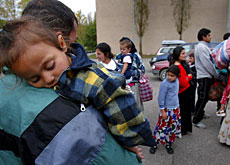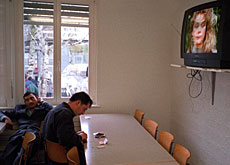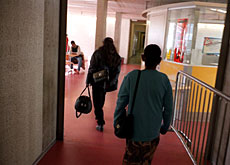Asylum cuts may drive refugees underground

New measures to stop welfare benefits for rejected asylum applicants could boost the number of people living in Switzerland illegally, warn support groups.
But the government says the move will ease pressure on the system by deterring bogus asylum seekers from coming to the country.
The new measures, which come into force on Thursday, are being implemented by the Federal Refugee Office as part of a controversial government savings plan, which aims to cut public spending by SFr3.3 billion ($2.6 billion).
The budget for the asylum sector, which is one of the hardest hit by the cuts, will be reduced by SFr137 million over the next three years.
The office believes that stopping welfare payments for asylum seekers whose applications have been turned down will put pressure on them to leave Switzerland.
The government says the measures will also lead to long-term savings by deterring refugees from coming to the country in the first place.
Abusive
“Through these measures, we want to make Switzerland a less attractive place for people whose asylum claims are ill-founded and [who abuse the system],” said Mathias Stettler of the Federal Refugee Office.
With the federal authorities no longer providing welfare benefits, it will be up to the cantons to provide so-called emergency aid in the form of short-term food supplies and shelter for those forced to leave the country.
The government will give cantons SFr600 per asylum seeker to cover the cost of emergency aid. Cantons will also receive SFr1,000 for every person they send back to their country of origin.
But the Swiss Refugee Council believes that many cantonal authorities are ill-prepared to cope with these demands and will fail to make these refugees aware of their right to the aid.
Crime
“We are concerned that, as a result of the measures, many people will decide to stay in the country illegally and will be drawn into crime,” Jürg Schertenleib of the Refugee Council told swissinfo.
Schertenleib explained that the inevitable rise in homelessness and crime, along with the cost of emergency aid, would eventually drive up costs for cantons and facilities such as homeless shelters.
Another consequence, he added, is that failed applicants would be incarcerated while awaiting deportation – a measure which would also add to the costs.
Inexperienced
The cantons have had over a year to prepare for the new measures, but Stettler admits that not all of them may be ready.
“The problem is that until now the cantons have had very little experience in dealing with people asking for minimal [emergency] aid,” Stettler told swissinfo.
“But it is the cantons’ responsibility to take appropriate measures – it is not up to the federal government to provide regulations.”
Stettler also acknowledges there is a risk that some failed applicants will go to ground in a bid to stay in Switzerland, although he believes the number who do so will be negligible.
Illegal
“We already have a lot of foreigners living here illegally,” he said. “There will be about 4,000 people [whose applications are turned down] this year. Of these, a small number might stay and require emergency aid.”
The number of asylum seekers dropped by 20 per cent in 2003, with 20,806 applications. Meanwhile the number of rejections rose to 7,818, compared with 6,445 rejections in 2002.
swissinfo, Joanne Shields
According to the Swiss Refugee Council, it costs the authorities:
SFr50 per day to keep someone in a reception centre;
SFr150 per day to keep someone in an emergency shelter;
SFr300 per day to put someone in prison.
In 2003, 20,806 people applied for asylum in Switzerland, 20% less than in 2002.
7,818 requests were turned down, compared with 6,445 the previous year.
Under Swiss asylum law, a claim is considered ill-founded if applicants do not reveal their identity, hand in their papers or collaborate fully during application proceedings.
The term also applies to people from safe countries or who apply after having already resided illegally in Switzerland for some time.
Before the new measures were introduced, failed applicants were automatically offered a place in a reception centre and given food and SFr3 a day.

In compliance with the JTI standards
More: SWI swissinfo.ch certified by the Journalism Trust Initiative










You can find an overview of ongoing debates with our journalists here . Please join us!
If you want to start a conversation about a topic raised in this article or want to report factual errors, email us at english@swissinfo.ch.